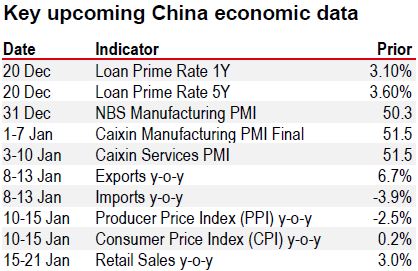
17 December 2024
China’s top policymakers met for the annual Central Economic Work Conference (CEWC), 11- 12 Dec, to discuss the progress on economic growth and to set policy priorities for next year. The tone echoed the stronger policy stance taken at the Politburo meeting on 9 Dec which called for “extraordinary countercyclical” measures to support growth. Policymakers noted that external pressures have risen while the domestic environment faces its own challenges. They also reiterated their resolve to meet longer-term goals of transitioning the economy.
No hard figures: As expected, the CEWC didn’t set quantitative economic and policy targets for 2025, which are often unveiled during the annual Two Sessions in March. Qualitatively, the goal is to ‘maintain steady economic growth’, which suggests the growth target may not deviate much from this year’s c5%.
Fiscal policy to be proactive: The CEWC continued to give clear forward guidance around fiscal policy, noting that the fiscal deficit should be widened, while also increasing the issuance of ultra-long dated special central and local government bonds. This suggests a stronger fiscal stance is likely to come through next year.
More aggressive monetary policy to come through: Echoing the language from the December Politburo meeting, the CEWC called for ‘moderately loose’ monetary policy, with cuts to required reserve ratios (RRR) and interest rates to be made at the appropriate time, while liquidity should remain ample. The People’s Bank of China (PBoC) may also purchase treasury bonds in the secondary market to inject liquidity.
Stepped-up support for consumption: The CEWC press release noted that ‘special actions to boost consumption’ would be taken. These include boosting support for durable goods tradein and equipment upgrading programs, enhancing social safety nets (including employment support), and increasing basic pensions and financial subsidies for medical insurance. The CEWC also pledged to protect people’s livelihood and safeguard social stability.
Stabilising housing and equity markets: As policymakers now see the housing market as systemically important to the economy, more forceful measures can be expected if current policies fail to shore up the market. As for the equity market, the latest development is the expansion of the private pension scheme from pilot cities to the entire nation starting from 15 Dec, while making index equity funds and government bonds eligible pension products.
Preventing ‘involutionary competition’: The CEWC mentioned that a policy priority is to“comprehensively manage involution-style competition and regulate the behaviour of local governments and enterprises”. We believe this refers to fierce competition in several sectors which has contributed to the profit margin squeeze, over-supply, and deflationary pressure. Taken together, this could mean the government will prioritise consumption support to mitigate supply-demand imbalances, before considering more decisive measures to reduce capacity.
New law to boost business sentiment: The Private Economy Promotion law will be enacted to help regulate local government behaviour, particularly regarding extraterritorial and profitdriven law enforcement. The ongoing RMB10trn debt swap has, to some extent, relieved local government debt repayment pressure, and thus reduced incentives for profit-driven law enforcement, but this new law will add an important layer of protection to private enterprises.
What about the potentially increasing trade tensions? In addition to more policy support for domestic demand, China is determined to stay open and plans to expand unilateral opening-up in an orderly manner. Notably, China has expanded unilateral visa-waiver programs for more countries and visa-free transit policy to more ports. The next step of opening-up may progress towards fewer restrictions on trade and investment flows.

Source: LSEG Datastream

* Past performance is not an indication of future returns
Source: LSEG Datastream. As of 13 December 2024 market close






Additional disclosures
1. This report is dated as at 16 December 2024.
2. All market data included in this report are dated as at close 13 December 2024, unless a different date and/or a specific time of day is indicated in the report.
3. HSBC has procedures in place to identify and manage any potential conflicts of interest that arise in connection with its Research business. HSBC's analysts and its other staff who are involved in the preparation and dissemination of Research operate and have a management reporting line independent of HSBC's Investment Banking business. Information Barrier procedures are in place between the Investment Banking, Principal Trading, and Research businesses to ensure that any confidential and/or price sensitive information is handled in an appropriate manner.
4. You are not permitted to use, for reference, any data in this document for the purpose of (i) determining the interest payable, or other sums due, under loan agreements or under other financial contracts or instruments, (ii) determining the price at which a financial instrument may be bought or sold or traded or redeemed, or the value of a financial instrument, and/or (iii) measuring the performance of a financial instrument or of an investment fund.
This document is prepared by The Hongkong and Shanghai Banking Corporation Limited (‘HBAP’), 1 Queen’s Road Central, Hong Kong. HBAP is incorporated in Hong Kong and is part of the HSBC Group. This document is distributed by HSBC Continental Europe, HBAP, HSBC Bank (Singapore) Limited, HSBC Bank (Taiwan) Limited, HSBC Bank Malaysia Berhad (198401015221 (127776-V))/HSBC Amanah Malaysia Berhad (200801006421 (807705-X)), The Hongkong and Shanghai Banking Corporation Limited, India (HSBC India), HSBC Bank Middle East Limited, HSBC UK Bank plc, HSBC Bank plc, Jersey Branch, and HSBC Bank plc, Guernsey Branch, HSBC Private Bank (Suisse) SA, HSBC Private Bank (Suisse) SA DIFC Branch, HSBC Private Bank Suisse SA, South Africa Representative Office, HSBC Financial Services (Lebanon) SAL, HSBC Private banking (Luxembourg) SA and The Hongkong and Shanghai Banking Corporation Limited (collectively, the “Distributors”) to their respective clients. This document is for general circulation and information purposes only. This document is not prepared with any particular customers or purposes in mind and does not take into account any investment objectives, financial situation or personal circumstances or needs of any particular customer. HBAP has prepared this document based on publicly available information at the time of preparation from sources it believes to be reliable but it has not independently verified such information. The contents of this document are subject to change without notice. HBAP and the Distributors are not responsible for any loss, damage or other consequences of any kind that you may incur or suffer as a result of, arising from or relating to your use of or reliance on this document. HBAP and the Distributors give no guarantee, representation or warranty as to the accuracy, timeliness or completeness of this document. This document is not investment advice or recommendation nor is it intended to sell investments or services or solicit purchases or subscriptions for them. You should not use or rely on this document in making any investment decision. HBAP and the Distributors are not responsible for such use or reliance by you. You should consult your professional advisor in your jurisdiction if you have any questions regarding the contents of this document. You should not reproduce or further distribute the contents of this document to any person or entity, whether in whole or in part, for any purpose. This document may not be distributed to any jurisdiction where its distribution is unlawful.
The following statement is only applicable to HSBC Bank (Taiwan) Limited with regard to how the publication is distributed to its customers: HSBC Bank (Taiwan) Limited (“the Bank”) shall fulfill the fiduciary duty act as a reasonable person once in exercising offering/conducting ordinary care in offering trust services/business. However, the Bank disclaims any guaranty on the management or operation performance of the trust business.
The following statement is only applicable to by HSBC Bank Australia with regard to how the publication is distributed to its customers: This document is distributed by HSBC Bank Australia Limited ABN 48 006 434 162, AFSL/ACL 232595 (HBAU). HBAP has a Sydney Branch ARBN 117 925 970 AFSL 301737.The statements contained in this document are general in nature and do not constitute investment research or a recommendation, or a statement of opinion (financial product advice) to buy or sell investments. This document has not taken into account your personal objectives, financial situation and needs. Because of that, before acting on the document you should consider its appropriateness to you, with regard to your objectives, financial situation, and needs.
Important Information about the Hongkong and Shanghai Banking Corporation Limited, India (“HSBC India”)
HSBC India is a branch of The Hongkong and Shanghai Banking Corporation Limited. HSBC India is a distributor of mutual funds and referrer of investment products from third party entities registered and regulated in India. HSBC India does not distribute investment products to those persons who are either the citizens or residents of United States of America (USA), Canada or New Zealand or any other jurisdiction where such distribution would be contrary to law or regulation.
Mainland China
In mainland China, this document is distributed by HSBC Bank (China) Company Limited (“HBCN”) and HSBC FinTech Services (Shanghai) Company Limited to its customers for general reference only. This document is not, and is not intended to be, for the purpose of providing securities and futures investment advisory services or financial information services, or promoting or selling any wealth management product. This document provides all content and information solely on an "as-is/as-available" basis. You SHOULD consult your own professional adviser if you have any questions regarding this document.
The material contained in this document is for general information purposes only and does not constitute investment research or advice or a recommendation to buy or sell investments. Some of the statements contained in this document may be considered forward looking statements which provide current expectations or forecasts of future events. Such forward looking statements are not guarantees of future performance or events and involve risks and uncertainties. Actual results may differ materially from those described in such forward-looking statements as a result of various factors. HSBC India does not undertake any obligation to update the forward-looking statements contained herein, or to update the reasons why actual results could differ from those projected in the forward-looking statements. Investments are subject to market risk, read all investment related documents carefully.
© Copyright 2025. The Hongkong and Shanghai Banking Corporation Limited, ALL RIGHTS RESERVED.
No part of this document may be reproduced, stored in a retrieval system, or transmitted, on any form or by any means, electronic, mechanical, photocopying, recording or otherwise, without the prior written permission of The Hongkong and Shanghai Banking Corporation Limited.
Important information on sustainable investing
“Sustainable investments” include investment approaches or instruments which consider environmental, social, governance and/o r other sustainability factors (collectively, “sustainability”) to varying degrees. Certain instruments we include within this category may be in the process of changing to deliver sustainability outcomes.
There is no guarantee that sustainable investments will produce returns similar to those which don’t consider these factors. Sustainable investments may diverge from traditional market benchmarks.
In addition, there is no standard definition of, or measurement criteria for sustainable investments, or the impact of sustainable investments (“sustainability impact”). Sustainable investment and sustainability impact measurement criteria are (a) highly subjective and (b) may vary significantly across and within sectors.
HSBC may rely on measurement criteria devised and/or reported by third party providers or issuers. HSBC does not always conduct its own specific due diligence in relation to measurement criteria. There is no guarantee: (a) that the nature of the sustainability impact or measurement criteria of an investment will be aligned with any particular investor’s sustainability goals; or (b) that the stated level or target level of sustainability impact will be achieved.
Sustainable investing is an evolving area and new regulations may come into effect which may affect how an investment is categorised or labelled. An investment which is considered to fulfil sustainable criteria today may not meet those criteria at some point in the future.